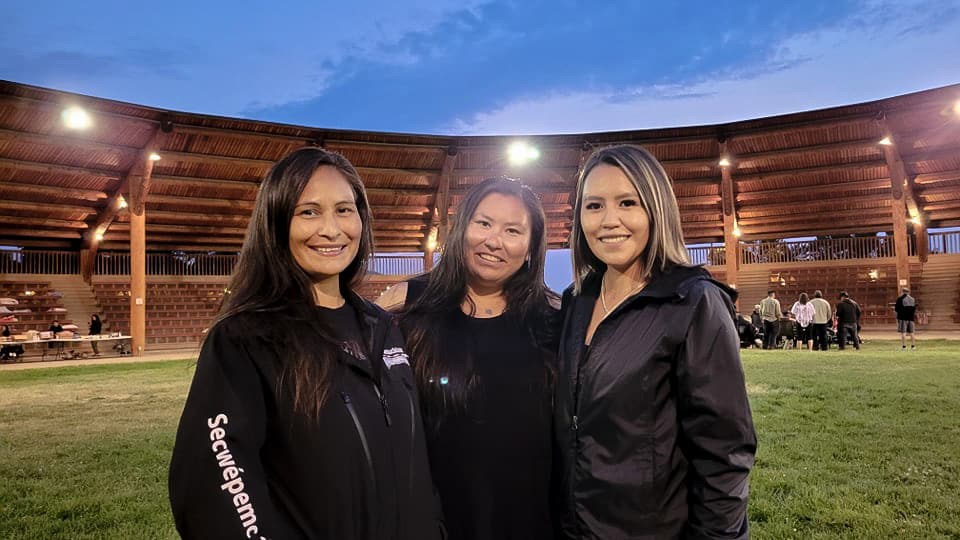On June 30, 2021, residents of the Village of Lytton and surrounding areas evacuated to flee the Lytton Creek wildfire, which tore through the town and destroyed most of its buildings. The fire came after the town broke the Canadian heat record on three consecutive days, topping at 49.6 C on June 29.
There are now several more significant fires burning in the region, with active evacuation orders and alerts in place. At least 11 communities have set up reception centres to welcome and tend to fire evacuees.
The powwow arbour at Tk’emlúps te Secwépemc, close to several of the evacuated areas, became one of those safe places for many.
Jessika K. Myers, Morning Star Peters and Nikki Fraser live in Tk’emlúps te Secwépemc and say it has been an honour to help so many, dishing out about 2,750 meals in the span of five days, from July 2 to July 7.
“We are blessed and privileged to be able to do this,” says Peters, a Secwépemc mother and dedicated grassroots helper from St’uxwtews (Bonaparte First Nations) and Tk’emlúps te Secwépemc.
‘If you are in our territory, we will take care of you’
On the evening of Wednesday, July 7, children begin to ride bikes and laugh as they cycle around the arbour. In the background, men and women drum and sing for the people. Standing in the centre of the arbour you see stacks of donations neatly organized on the powwow bleachers. Children laugh as they watch TV in the entertainment area that was set up for them.
The women, who are very clear they are only a small “sliver of the core group” of people who are helping with hosting the evacuees and firefighters, say this is all just part of who they’ve been brought up to be.
“Part of our protocol is to take care of our guests. That’s instilled into us as who we are as Secwépemc Peoples,” Fraser says. “If you are in our territory we will take care of you.”
Fraser, who is also a mother and works full-time, says she and the rest of the crew of volunteers have been working tirelessly since the discovery of the 215 remains at the Kamloops Indian Residential “School” to feed people and ensure guests feel welcomed at the powwow grounds.
“We’ve worked to make it a family environment, a culturally oriented environment,” Myers says. “The songs and the culture is medicine for our people.”
The women share that the efforts supporting fire evacuees are separate from their work supporting the community after the announcement that the remains of 215 children had been found. But that confirmation of what was already known continues to fuel their passion for asserting their responsibility to the people through “continuing to honour their lives … by living ours,” Fraser says.
Not only are they serving fire evacuees, but they are also serving firefighters. They make sure to have both breakfast and lunch ready to go for firefighters so they are nourished while battling the blazes.
One of the heartwarming stories shared by Fraser is of a firefighter who had been sleeping in his car. He showed up to the arbour and volunteers offered to feed and shelter him.
“He got a tent, he got a mattress and he got a pillow and sleeping bag.
“He gets fed every night. He’s non-Indigenous, and he said, ‘Your guys’ music puts me to sleep every night.’ And he was so grateful,” Fraser says.
“We are not the bosses — the evacuees are our bosses, the firefighters are our bosses,” she says.
The work began when Peters’s mother called to let her know that evacuees were showing up at the arbour. Immediately, Peters put a call-out on Facebook and the volunteers began to roll in.
“Everyone shows up and rolls up their sleeves,” Peters says.
Myers says when she answered the call for action, it was “a natural thing to do, serving the people [and] offering community support.”
Passing on teachings and responsibilities through knowledge transfers
This support has not just been from a small group of people. It is a collective effort spanning across all generations that has made hosting the fire evacuees possible.
As mothers and women who are guided by their teachings on Secwepemcúĺecw, they say that they hope for their children to witness and take part in the work being done.
“I bring my children here. They’ve spent 12- to 15-hour days here from the 215 [announcement] until now. And I’m really proud of them. They don’t complain, they don’t ask what we’re doing — they know what we’re doing here. They ask, ‘Are we going to the arbour today?’ [I say,] ‘Yes, we are,’” says Peters.
For Peters, that’s exactly what’s been taught to her through witnessing and taking part in the knowledge transfers that happen naturally through the act of witnessing.
“I knew all of this because I watched my mom, and I watched my aunties — Rosie Casimir. It was my Granny Lila that I watched do these things at funerals and times of need.
“That’s what taught me to move into this position. … Mom says we’re in training, and it is. It’s training that we’re in our whole lives, whether it’s tradition or what our family is teaching us, [it is] instilled in us,” says Peters.






